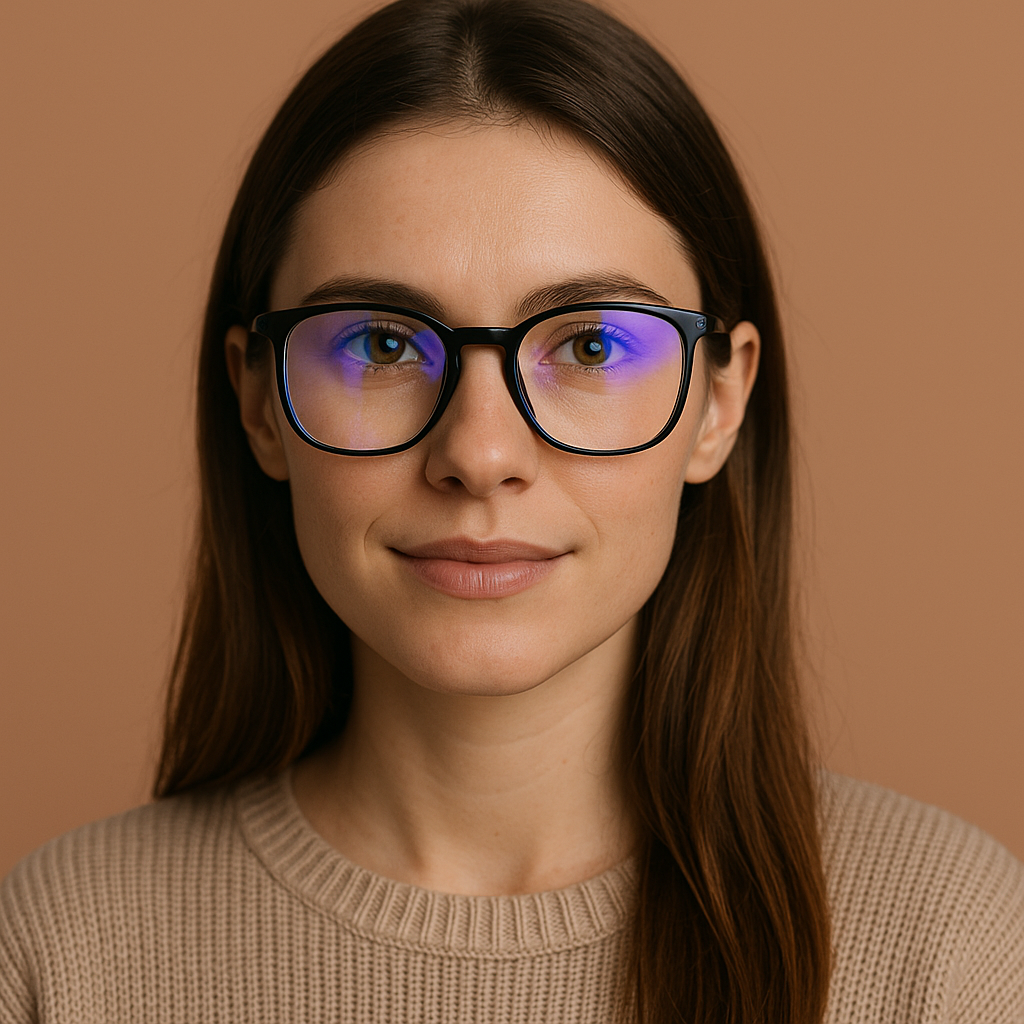You’ve probably heard the buzz about blue light…
If your eyes feel tired after a long day on your phone or computer, you’re not alone. Many patients ask us whether blue light from digital screens is harming their eyes — or if those blue-light glasses everyone’s talking about actually work. Let’s separate fact from fiction and go over what the science really says.
What Exactly Is Blue Light?
Blue light is a type of visible light on the color spectrum — right next to ultraviolet (UV) light. It has a short wavelength (around 400–500 nanometers). It’s found naturally in sunlight and artificially in LED lights, TVs, phones, and computer screens. It helps regulate your sleep cycle (circadian rhythm) and can even boost alertness during the day.
So, blue light isn’t “bad.” The concern is how much and when we’re exposed to it — especially in our modern, screen-filled lives.
Does Blue Light Damage the Eyes?
Short answer: Not at the levels from your devices. According to both the American Optometric Association (AOA) and the American Academy of Ophthalmology (AAO), current research shows no proven link between blue light from screens and permanent retinal damage.
However, digital eye strain is a very real concern. When we focus on screens for hours, we blink less, our eyes dry out, and our focusing muscles fatigue — causing that burning, tired, or “heavy” eye feeling many people blame on blue light.
The Real Issue: Digital Eye Strain
Symptoms of digital eye strain include:
- Dry, irritated, or watery eyes
- Blurry or fluctuating vision
- Headaches or eye fatigue
- Trouble focusing after screen use
Blue light itself isn’t the main cause — our habits are. Try these quick fixes:
1. Follow the 20-20-20 rule: Every 20 minutes, look 20 feet away for 20 seconds.
2. Blink often and fully: It refreshes your tear film.
3. Adjust lighting: Avoid glare from windows or overhead lights.
4. Keep screens slightly below eye level.
Are Blue-Light Glasses Worth It?
It depends on your lifestyle. For some patients, blue-light-filtering lenses can reduce glare and visual fatigue, especially for those who spend 6 hours or more on computers daily. They can also help reduce nighttime exposure that affects sleep.
They’re not a medical necessity, but if they make your eyes feel more comfortable, they’re worth considering. At Infocus Eye Care, we often recommend anti-reflective coatings that block a portion of blue light while also cutting reflections and improving clarity.
Blue Light and Sleep
Blue light from screens can delay melatonin release, which makes it harder to fall asleep — especially if you’re scrolling in bed.
To help your body wind down:
- Dim your screen or use “Night Shift” mode after sunset
- Avoid screens 1 hour before bedtime
- Try warm ambient lighting instead of bright overheads
Our Takeaway
Blue light isn’t something to fear — it’s something to manage wisely. Most eye discomfort from screens can be solved with better habits, regular eye exams, and personalized eyewear.
If you’re experiencing tired eyes, blurred vision, or frequent headaches, come see us at Infocus Eye Care. We’ll help pinpoint the cause and create a plan that keeps your eyes comfortable — both on and off the screen.
Schedule Your Eye Exam
Infocus Eye Care – Colorado Springs
Your local experts in modern vision and comfort care.
Schedule Online | https://infocuseyecarecs.com/
Call (719)-602-4082
References
- American Optometric Association – Blue Light and Your Eyes (2023)
- American Academy of Ophthalmology – Blue Light and Digital Eye Strain (2024)
- Review of Optometry – What We Know (and Don’t) About Blue Light

